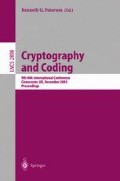Abstract
In [3] an elementary attack against a true (physical) random number generator presented at CHES 2002 ([9]) was described under the condition that the attacker knows all (i.e. also the unpublished) details. In the present paper the general design is analyzed and conditions of use are formulated under which the random number generator is unconditionally secure.
Access this chapter
Tax calculation will be finalised at checkout
Purchases are for personal use only
Preview
Unable to display preview. Download preview PDF.
References
AIS 31: Functionality Classes and Evaluation Methodology for Physical Random Number Generators. Version 1 (25.09.2001) (mandatory if a German IT security certificate is applied for; English translation). www.bsi.bund.de/zertifiz/zert/interpr/ais31e.pdf
Common Criteria for Information Technology Security Evaluation, Part 1-3; Version 2.1, August 1999 and ISO 15408:1999
Dichtl, M.: How to Predict the Output of a Hardware Random Number Generator. In: Walter, C.D., Koç, Ç.K., Paar, C. (eds.) CHES 2003. LNCS, vol. 2779, pp. 181–188. Springer, Heidelberg (2003); (Preversion also in IACR Cryptology ePrint Archive, Report 2003/051)
Hoeffding, W., Robbins, H.: The Central Limit Theorem for Dependent Random Variables. Duke Math. J. 15, 773–780 (1948)
Information Technology Security Evaluation Criteria (ITSEC); Provisional Harmonised Criteria, Version 1.2 (June 1991)
Killmann, W., Schindler, W.: A Proposal for: Functionality Classes and Evaluation Methodology for True (Physical) Random Number Generators. Version 3.1 (25.09.2001), mathematical-technical reference of [1] (English translation), www.bsi.bund.de/zertifiz/zert/interpr/trngk31e.pdf
Menezes, A.J., van Oorschot, P.C., Vanstone, S.C.: Handbook of Applied Cryptography. CRC Press, Boca Raton (1997)
Schindler, W., Killmann, W.: Evaluation Criteria for True (Physical) Random Number Generators Used in Cryptographic Applications. In: Kaliski Jr., B.S., Koç, Ç.K., Paar, C. (eds.) CHES 2002. LNCS, vol. 2523, pp. 431–449. Springer, Heidelberg (2003)
Tkacik, T.: A Hardware Random Number Generator. In: Kaliski Jr., B.S., Koç, Ç.K., Paar, C. (eds.) CHES 2002. LNCS, vol. 2523, pp. 450–453. Springer, Heidelberg (2003)
Author information
Authors and Affiliations
Editor information
Editors and Affiliations
Rights and permissions
Copyright information
© 2003 Springer-Verlag Berlin Heidelberg
About this paper
Cite this paper
Schindler, W. (2003). A Stochastical Model and Its Analysis for a Physical Random Number Generator Presented At CHES 2002. In: Paterson, K.G. (eds) Cryptography and Coding. Cryptography and Coding 2003. Lecture Notes in Computer Science, vol 2898. Springer, Berlin, Heidelberg. https://doi.org/10.1007/978-3-540-40974-8_22
Download citation
DOI: https://doi.org/10.1007/978-3-540-40974-8_22
Publisher Name: Springer, Berlin, Heidelberg
Print ISBN: 978-3-540-20663-7
Online ISBN: 978-3-540-40974-8
eBook Packages: Springer Book Archive

